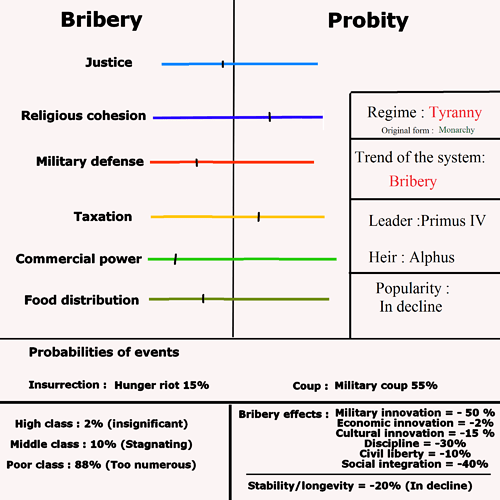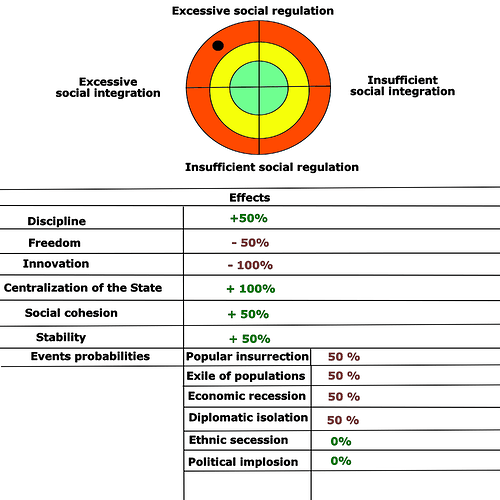Hello, I would like to contribute to the development of the game and especially to the social phase and the industrial phase.
To do so, I would like to transcribe in terms of gameplay the thoughts of different thinkers from political science, sociology and economics so that you can develop the game in the most realistic way possible. This topic will therefore be a reservoir of ideas for developers.
I am available to discuss if developers or simply players wish to debate my gameplay proposals.
I would gradually add content to the topic.
Institutional Gameplay inspired by Aristotle’s theories.
Variable of class 1
-
A single sovereign
-
A small group of rulers
-
A sovereign people.
Variable of class 2
-
Probity
-
Bribery
For Aristotle, the passage from a degree of probity to a degree of bribery would be caused by the attraction for the general interest or the pursuit of particular interests.
For Aristotle, for society to serve the common good, six public functions must be properly performed :
-
Food distribution.
-
Commercial power.
-
Military defense
-
Taxation.
-
Religious cohesion.
-
The exemplarity of justice.
Aristotle maintains that if these functions are ensured, the middle class can develop and society can prosper.
If, on the contrary, these parameters are unbalanced, society is affected by bribery.
Possible combinations :
- A single sovereign + Probity = Royalty (enlightened despotism)
- A single sovereign + Bribery = Tyranny (dictatorship)
- A small group of rulers + Probity = Aristocracy (government of the wise / meritocracy )
- A small group of rulers + Bribery = Oligarchy (government of the rich)
- A sovereign people + Probity = “Republic” (Democracy)
- A sovereign people + Bribery = Demagogy (failing democracy)
Effect :
-
Tyranny = (+) military innovation; (-) economic innovation; (-) cultural innovation; (+) discipline; (-) civil liberty; (-) social integration; (-) stability/longevity.
-
Royalty = (+) military innovation; (-) economic innovation; (-) cultural innovation; (+) discipline; (-) civil liberty; (+) social integration; (+) stability/longevity.
-
Aristocracy: (-) military innovation; (+) economic innovation; (+) cultural innovation; (-) discipline; (+) civil liberty; (+) social integration; (-) stability/longevity
-
Oligarchy: (-) military innovation; (+) economic innovation; (-) cultural innovation; (-) discipline; (-) civil liberty; (-) social integration; (-) stability/longevity.
-
“Republic” (Democracy): (-) military innovation; (+) economic innovation; (+) cultural innovation; (-) discipline; (+) civil liberty; (+) social integration; (+) stability/longevity.
-
Demagogy : (-) military innovation; (-) economic innovation; (-) cultural innovation; (-) discipline; (+) civil liberty; (+) social integration; (-) stability/longevity
Example of gameplay interface :
Source : “Politics” by Aristotle
Sociological gameplay inspired by the theories of Weber :
Types of political domination :
- Legal-rational domination = Legitimacy of political law (Rule of Law, Republic)
- Traditional Domination = Legitimacy of social tradition/custom (Empire, Royalty, Feudalism, Constitutional Monarchy)
- Charismatic domination = Personal legitimacy of the leader (Despotism, Authoritarianism, Totalitarianism)
Effect :
-
Legal-rational domination = (+) military innovation; (+) economic innovation; (+) cultural innovation; (-) discipline; (+) civil liberty; (-) social integration; (+) stability/longevity
-
Traditional domination = (-) military innovation; (-) economic innovation; (-) cultural innovation; (+) discipline; (-) civil liberty; (+) social integration; (+) stability/longevity
-
Charismatic domination = (+) military innovation; (-) economic innovation; (-) cultural innovation; (+) discipline; (-) civil liberty; (+) social integration; (-) stability/longevity
Example of gameplay interface :

Source : “The Three Types of Legitimate Rule” by Max Weber.
Sociological gameplay inspired by Durkheim’s theories.
Variable of class 1 :
-
Lack of social regulation = Individuals are completely free of their actions and constantly ask themselves existential questions (Libertarian/anarchic society)
-
Excessive social regulation = Social life is extremely regulated, individual margins of maneuver are reduced (Authoritarianism, Totalitarianism, police state).
Variable of class 2 :
-
Lack of integration = Individuals are not attached to society and think only of themselves (Individualistic and multicultural democracy)
-
Excessive integration = Individuals live to serve a political ideal (Nationalism, Theocracy, Communism)
Effect :
-
Lack of social regulation = (-) discipline; (+) freedom; (+) innovation; (-) centralization of the State ;
-
Excess of social regulation = (+) discipline; (-) freedom; (-) innovation; (+) centralization of the State ;
-
Lack of integration = (-) social cohesion; (-) stability; (+) innovation; (-) centralization of the State ;
-
Excessive integration = (+) social cohesion; (+) stability; (-) innovation; (+) centralization of the State ;
Particularly dangerous effects :
-
Lack of social regulation = Risk of political implosion (such as the implosion of the Holy Roman Germanic Empire or the fall of the Roman Empire) and development of competing political factions (warlords, militias, gangs, political movements, …) within the country to the detriment of the State.
-
Excessive social regulation = Risk of popular insurrection and revolutions.
-
Lack of integration = Risk of ethnic secession, civil war and community conflicts.
-
Excessive integration = Risk of exile of marginalized populations, economic recession, and diplomatic weakening of the country.
Gameplay interface example :
Source : “Suicide : A Study in Sociology” by Emile Durkheim.
Historical gameplay inspired by Hegel’s theories.
According to Hegel, the goal of History is to achieve the synthesis of freedom and reason. The actors of History are not individuals but peoples. Each people would have a mentality.
Each stage of history consists of three procedures:
-
The elaboration of the thesis A = a people A established its state on a territory.
-
The elaboration of the antithesis B = a people B claims this territory.
-
The appearance of the synthesis C = People B conquers people A and adopts its customs or people A and people B form a political alliance (fusion of A and B). The synthesis of A and B gives birth to the people C (A+B=C).
The stage of synthesis absorbs the two previous actors, without sacrificing their own significance.
To go beyond, in Hegel’s case, is to deny but to preserve, without annihilating.
In the social era, the player’s objective is to absorb the attributes of other peoples of his species for his own benefit. In this respect, each people has its own attributes.
Examples of attributes :
-
Culture of Migration = faster migration/movement of the group, allowing faster access to food-rich land and avoiding starvation and death of the people.
-
Culture of Sacrifice = increased social cohesion and increased cultural innovation
-
Culture of Discipline = strengthening of social cohesion and productivity but weakening of innovation.
Source : “Lectures on the Philosophy of History” by Georg Wilhelm Friedrich Hegel.
Decadence gameplay inspired by Montesquieu:
In several index are to be monitored to ensure the stability of his state:
-
Government stability (some types of government being more unstable than others) ;
-
Territorial expansion (suffering several defeats, losing cities repeatedly or simply losing territorial influence impacts the stability of the State) ;
-
Epidemics (diseases can cause sudden population declines and weaken power) ;
-
Corruption (an index that grows when the political system has not been reformed and the territory has not expanded for a long period of time) ;
-
Diplomatic image (certain political actions or certain types of political regimes can be detrimental to this index) ;
-
Cultural power (social cohesion must remain strong, otherwise cultural rebellions may appear).
Degree of stability :
Very stable = Degree higher than 75
Stable = Degree between 25 and 75
Stagnant = Degree between -25 and 25.
Unstable = Degree between -25 and -75
Extremely unstable = Degree less than -75
Effects of instability:
If a state becomes extremely unstable, it will lose part of its territory/cities (50%) and new small independent nations will appear on it.
Some doctrines can facilitate state instability while others limit it.
When a state collapses, some of the states it had conquered may reappear on the land they once occupied.
Source : “Considerations on the Causes of the Greatness of the Romans and their Decline” by Montesquieu.

